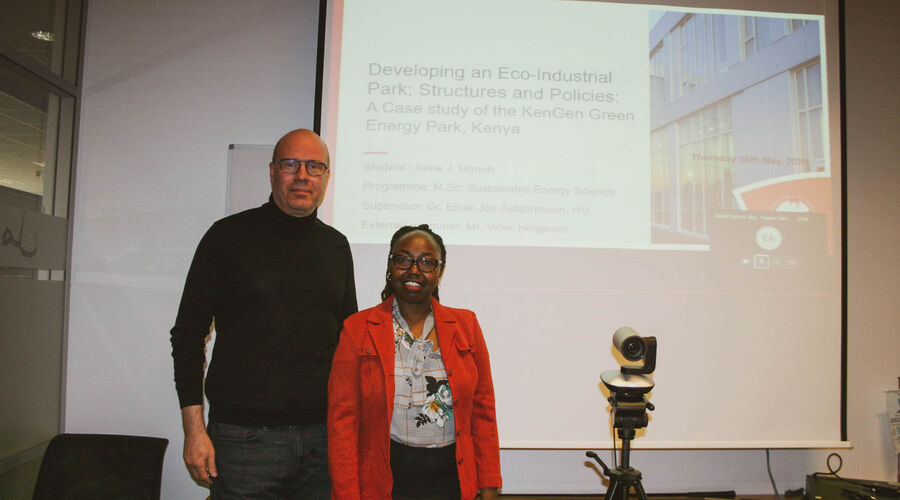MSc Thesis: Developing an Eco-Industrial Park; Structures and Policies: A Case study of the KenGen Green Energy Park, Kenya
REYKJAVIK, May 28 - MSc in Sustainable Energy candidate, Irene Jepkorir Ronoh, successfully defended her master's thesis where she developed structures and policies pertaining to the KenGen Green Energy Park, an eco-industrial park in Kenya. Irene's research was supervised by Einar Jón Ásbjörnsson from Reykjavik University, and Sigurður H. Markússon from Landsvirkjun, the National Power Company of Iceland.

Setting the motivation for her research, Irene states that KenGen Green Energy Park intends to use renewable geothermal resources for the production of steel, glass, textile, leather, organic fertilizer, and food processing. In order to do so, KenGen will harness the required thermal energy from 2000 t/hr of geothermal brine in various separator stations and steam from low-enthalpy geothermal wells.
Irene's study aimed at developing this park as a sustainable and competitive Eco-Industrial Park, through improved efficiency, by embracing a robust circular economy. Her objective was to develop industrial clusters, assess material flows within the clusters and determine industrial symbiotic opportunities between the firms. To develop a multi-criteria assessment of policy interventions and recommendations to the energy park, Irene used the standard EIP International Framework. Specifically, the tools she used in her study were:
- Stan2Web software for Material Flow Analysis,
- An EIP policy tool for assessment of policy interventions,
- A stakeholder matrix for mapping relevant stakeholders, and
- A standard EIP management model as a guide to developing a park management model.
Irene saw that possible synergies emerge between firms that can potentially share these resources for mutual benefits. This industrial symbioses showed the creation of opportunities for utility and infrastructure sharing as well as waste and by-product exchanges. From her multi-criteria analysis, her results indicated that the development of a National Action Plan on EIP is essential. This incorporated industrial symbiosis and resource efficiency into the existing industrial policies. Other interventions Irene found relevant included inter alia; tax holidays to encourage SMEs, the use of renewable energy for industrial processes, increase foreign direct investment to EIPs and social capital creation.
As Irene explains, a stakeholder map guided the development of a park management model. Her model promotes a collaborative approach that underlines resource use efficiency through cleaner production and industrial symbiosis. Irene adds that it seeks to strengthen partnerships between industry, government, and research institutions to enhance eco-innovation. Her findings now form the basis for the development of KenGen Energy Park as an Eco-Industrial Park with an integrated and resource-efficient circular economy.
Congratulations Irene on an excellent thesis project!
